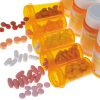- Empty cart.
- Continue Shopping
How to Safely Dispose of Expired Medication

The safe disposal of expired medication is a crucial aspect of responsible healthcare management. When medications reach their expiration date, they can become less effective or even harmful to your health. Simply tossing them in the trash or flushing them down the toilet can have adverse environmental consequences. In this informative guide, we will explore the reasons behind proper medication disposal and provide you with step-by-step instructions on how to safely dispose of expired medication.
Why Is Proper Medication Disposal Important?
1. Protecting Your Health
Expired medications can lose their potency and effectiveness over time. Using them may not provide the intended therapeutic benefits, potentially leading to ineffective treatment or, in some cases, worsening of the underlying condition. Additionally, expired drugs can degrade into harmful compounds that may pose health risks when consumed.
2. Preventing Accidental Consumption
Leaving expired medications in your medicine cabinet can lead to accidental consumption. This is especially concerning if children or pets have access to the area. Ingesting expired medications, even in small amounts, can result in adverse reactions or poisoning.
3. Reducing Environmental Impact
Improper disposal of medication, such as flushing it down the toilet or throwing it in the trash, can contaminate water sources and harm aquatic life. Pharmaceuticals can persist in the environment, affecting ecosystems and potentially entering the human food chain.
Steps for Safe Medication Disposal
Now that we understand the importance of proper medication disposal, let’s explore the steps you can take to safely dispose of expired medication.
1. Check Expiration Dates
Start by going through your medicine cabinet and carefully examining each medication’s expiration date. You’ll find this information on the label or packaging. If a medication has passed its expiration date, it’s time to dispose of it.
2. Follow Disposal Instructions
Many medications come with specific disposal instructions provided by the manufacturer. These instructions may include recommended disposal methods or disposal programs to participate in. Always follow these guidelines when available.
3. Participate in Medication Take-Back Programs
One of the safest and most convenient ways to dispose of expired medications is to participate in medication take-back programs. These programs are often organized by pharmacies, healthcare facilities, or local government agencies. They provide designated collection sites where you can drop off your unused and expired medications. The collected medications are then disposed of safely by professionals.
4. Utilize Drug Disposal Pouches
Drug disposal pouches, also known as medication disposal systems, are designed to deactivate and render medications safe for disposal in regular household trash. To use a disposal pouch, simply place the expired medications inside, add water, and seal the pouch. The pouch will chemically neutralize the drugs, making them safe for disposal in the trash. You can find these pouches at pharmacies and online retailers.
5. Mix with Undesirable Substances
If you don’t have access to drug disposal pouches, another option is to mix the expired medication with undesirable substances to discourage tampering. This method is suitable for solid medications. Start by crushing the pills or tablets and mixing them with something unappealing, such as used coffee grounds, cat litter, or dirt. Seal the mixture in a container or plastic bag before disposing of it in the trash.
6. Remove Personal Information
Before disposing of medication packaging, make sure to remove or obliterate any personal information, including your name and prescription details. This helps protect your privacy.
7. Do Not Flush Medications
Flushing medications down the toilet is generally discouraged as it can introduce pharmaceuticals into the water supply. However, in rare cases, the FDA recommends flushing certain medications, especially those with specific disposal instructions that indicate flushing is the safest option. Always check with your healthcare provider or pharmacist for guidance if you are unsure.
8. Educate Yourself on Local Regulations
Local regulations regarding medication disposal may vary, so it’s essential to educate yourself about the specific guidelines in your area. Some municipalities may have specific rules or programs in place for medication disposal, and it’s important to comply with these regulations.
Medication-Specific Disposal Considerations
Different types of medications may require unique disposal methods. Here are some specific considerations for various categories of drugs:
1. Prescription Medications
Prescription medications should be disposed of following the general guidelines mentioned earlier. Participating in a medication take-back program or using drug disposal pouches is often the best approach.
2. Over-the-Counter (OTC) Medications
Expired OTC medications, such as pain relievers or antacids, should also be disposed of using the methods mentioned above. Check the packaging for any specific disposal instructions provided by the manufacturer.
3. Controlled Substances
Controlled substances, such as opioids or certain anxiety medications, require special attention. Due to their potential for misuse and abuse, it’s crucial to dispose of them safely. Many pharmacies and law enforcement agencies offer take-back programs specifically for controlled substances.
4. Inhalers and Needles
Inhalers and needles should be disposed of carefully to prevent injury and contamination. Inhalers can often be returned to pharmacies for proper disposal, while needles should be placed in designated sharps containers and dropped off at approved collection sites.
In Conclusion, Properly disposing of expired medication is not only a matter of personal health and safety but also an environmental responsibility. By following the steps outlined in this guide and adhering to any local regulations, you can contribute to a safer and healthier community. Remember to stay informed about medication disposal options in your area, and always prioritize the well-being of yourself and the environment when handling expired medications.








